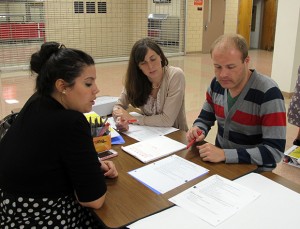What They’re Saying About The New Teach For America Study — And How It Might Frame Indiana’s Teacher Prep Debate

Elle Moxley / StateImpact Indiana
A group of new math teachers at the three Indianapolis schools run by Charter Schools USA work on lesson plans. The Florida company tasked with turning around Emma Donnan Middle School, T.C. Howe High School and Emmerich Manuel High School relied heavily on Teach For America recruits to staff the schools last year.
“We know little,” writes Jonathan Plucker in EdWeek, “about which types of teacher preparation prepare the most effective teachers.”
But we’re beginning to know a little more about at least one alternate teacher preparation program — Teach for America — and its effectiveness in preparing some of its corps members for the classroom, in one subject area, for one age group of students.
A policy research firm released a “rigorous,” federally-funded study Tuesday showing TFA teachers — recruited out of college to teach in poor or urban public schools — are “as effective as, and in some cases more effective than” other middle and high school educators in math.
“The gains weren’t miraculous,” writes POLITICO, but the study still has the edu-world all abuzz at the same time as Indiana policymakers try this week to figure out which programs do best in getting teachers ready for the classroom — and controversially pave new pathways into the profession.
We’ll get to the Indiana context in a second. First, a few more details on the study from POLITICO:Students of TFA teachers moved up, on average, from the 27th to the 30th percentile on standardized math tests. And the researchers acknowledge they have no way of knowing whether the students made a full year’s progress in math during their year with a TFA teacher, or just advanced more than other kids in their generally low-performing schools. Still, the researchers found statistically significant gains, which they calculated as the equivalent of about two and a half extra months of learning for students of TFA recruits.
“It’s important to realize this represents a relatively modest improvement in student achievement,” says education writer Dana Goldstein. It’s easier to raise math scores than literacy scores, she points out, adding that TFA stresses the importance of student achievement data in its training — data from standardized tests that teachers from traditional backgrounds are more likely to distrust.
And, Goldstein notes, the study shows years of classroom experience remains key:
The students of second-year teachers outperformed the students of first-year teachers by .08 standard deviations — a larger gap than the average one (.07) between the students of TFA and non-TFA teachers. And even though TFA recruits did well in this study, that doesn’t mean teachers reach their pinnacle after two years on the job. To the contrary, the researchers found that for teachers with at least five years of experience, each additional year of work was associated with a statistically significant increase… in student achievement.
The findings are notable partly for their implications for hot-button debates about how best to prepare effective teachers. TFA in particular has been a policy lightning rod, given its limited up-front training, aggressive expansion during a period of significant teacher layoffs, and fees it charges to school districts with which it contracts to place teachers.
Still, the evidence of its teachers’ effects is among the most convincing to date of TFA’S impact on secondary math. It also stands in stark contrast to the teacher-preparation field at large: Most, if not all, programs lack experimental evidence of their impact.
As Wonkblog writes, consensus appears to be forming that Teach for America corps members — at bare minimum — don’t perform any worse than the broader teaching force.
“Rigorous studies consistently show modest or significant positive effects — and perhaps more importantly given the context of the advocacy debate, they don’t show harm,” writes Eduwonk‘s Andrew Rotherham.
Coverage of the study released this week seems to be discounting earlier research from the team of Stanford education professor Linda Darling-Hammond, who found TFA teachers left the profession at high rates and couldn’t match the classroom performance of certified teachers from traditional educator prep programs at colleges and universities.
“Our study doesn’t say you shouldn’t hire Teach for America teachers,” Darling-Hammond told USA Today in 2005, when her study came out. “Our study says everyone benefits from preparation, including Teach for America teachers — that they become more effective when they became certified.”
Why This Matters For Indiana
As anyone who followed our REPA II coverage knows, the debate over how Indiana teachers get ready to enter the classroom has perhaps never been more heated.
Under former state superintendent Tony Bennett’s chairmanship, the State Board of Education passed the guidelines in December 2012. Though an administrative snafu prevented the rules from taking effect, they would’ve made it easier for a college graduate who didn’t major in education to obtain an Indiana teaching license. Current superintendent Glenda Ritz made her opposition to the new rules a campaign issue.
This session, state lawmakers passed a bill requiring the creation of a system for evaluating and rating Indiana’s teacher preparation programs by 2016.
Whether it’s amending guidelines for who can be allowed to teach in the state or crafting a system for determining which teacher preparation programs are effective, every data point — including Thursday’s TFA report — counts.

